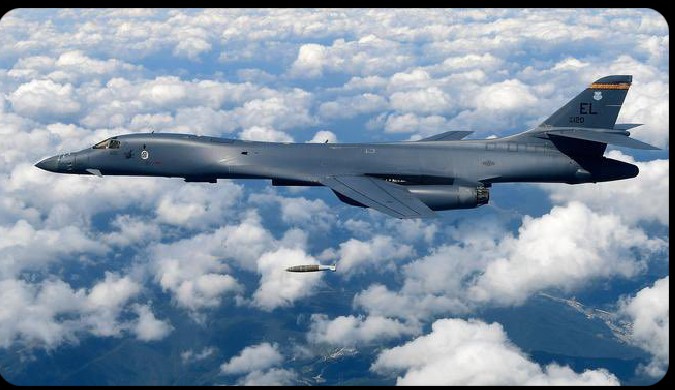
The US conducted major airstrikes on 85 targets across seven locations in Iraq and Syria on Friday, the start of what will likely be a series of larger-scale US strikes on Iranian-backed militias who have carried out attacks on US troops in the Middle East.
The retaliatory strikes – which lasted 30 minutes and were successful, according to the White House – came in response to a drone strike by Iran-backed militants on a US military outpost in Jordan on Sunday, which killed three US service members and wounded more than 40 others.
President Joe Biden said in a statement that the US military response “will continue at times and places of our choosing.”
“The United States does not seek conflict in the Middle East or anywhere else in the world. But let all those who might seek to do us harm know this: If you harm an American, we will respond,” Biden said.
The strikes on Friday were markedly more significant than previous attacks on Iranian-backed militias over the last several weeks, which have primarily focused on weapons storage or training facilities. But the administration is threading a needle – they want to deter and stop further attacks but avoid a full-scale conflict with Iran breaking out in a region already roiled by the continuing Israel-Hamas war in Gaza.
US Central Command confirmed in a statement that airstrikes were carried out in Iraq and Syria “against Iran’s Islamic Revolutionary Guards Corps (IRGC) Quds Force and affiliated militia groups.”
“U.S. military forces struck more than 85 targets, with numerous aircraft to include long-range bombers flown from United States. The airstrikes employed more than 125 precision munitions,” the statement said.
“The facilities that were struck included command and control operations, centers, intelligence centers, rockets, and missiles, and unmanned aerial vehicle storages, and logistics and munition supply chain facilities of militia groups and their IRGC sponsors who facilitated attacks against U.S. and Coalition forces,” the statement added.
Defense Secretary Lloyd Austin said in a statement that the strikes are “the start of our response.”
“We believe that the strikes were successful,” National Security Council spokesman John Kirby said.
Casualties likely
Kirby said the US does not know now how many militants were killed or wounded. He added that US military aircraft was now out of harm’s way. Lt. Gen. Douglas Sims, the director of the Joint Chiefs of Staff, said Friday that the locations of the strikes were chosen “with an idea that there would likely be casualties” among the IRGC and militia personnel who use them.
The strikes took place soon after Biden attended a dignified transfer and met family members of the soldiers killed in Jordan.
B-1 bombers – long-range heavy bombers that can deploy precision and non-precision weapons –were used in the operations, a defense official told CNN. Sims said Friday that the bombers flew in a “single non-stop flight” from the US, “all of that enhanced by our Transportation Command and our ability to gas and go along the way.”
Sims also said that the timing of the strikes was designed around good weather, in “an interest of ensuring that we’re hitting all the right targets.”
In a statement, Yahya Rasool, a spokesperson for Iraq’s Armed Forces, decried the strikes as a “violation of Iraqi sovereignty.”
“The city of Al-Qaim and the Iraqi border areas are being subjected to airstrikes by US aircraft, at a time when Iraq is striving hard to ensure the stability of the region,” Rasool said.
The mayor of Al-Qaim, Turki Al-Mahalawi, said the strikes hit three houses used as weapon warehouses by the PMU.
The US struck targets there last month.
‘We don’t seek a war with Iran’
Biden had been under increasing pressure to respond to the soldiers’ deaths in a way that stops the militia attacks for good, CNN previously reported. Iran-backed militants have targeted US military facilities in Iraq and Syria over 160 times since October, and several Republican lawmakers had called for the US to hit inside Iran directly to send a clear message. But administration officials have been clear that any response would be proportionate as to not further escalate things in the region.
A senior administration official confirmed to CNN that the US will not strike inside Iran – only focusing on targets outside of the country.
“We don’t seek a war with Iran. We’re not looking for a wider conflict in the Middle East,” Kirby told CNN on Monday.
On Wednesday the White House said it believes an umbrella group of militants called Islamic Resistance in Iraq was behind the drone attack in Jordan.
“We believe that the attack in Jordan was planned, resourced and facilitated by an umbrella group called the Islamic Resistance in Iraq, which contains multiple groups including Kata’ib Hezbollah,” Kirby said.
He stopped short of assigning exact blame on Kata’ib Hezbollah, the most powerful Iran-backed militia in Iraq, saying it was not the only group responsible for previous attacks on US bases.
“This certainly has the earmarks of the kinds of things that Kata’ib Hezbollah does,” he said, adding, “The attribution that that our intelligence community is comfortable with is that this was done by the umbrella group called the Islamic Resistance in Iraq.”
The US military has carried out several strikes targeting Iranian proxies’ weapons depots in Iraq and Syria since October, but none of those strikes deterred the militants, whose 165 attacks injured over 120 US service members across the region.
Iran has spent years investing in these regional proxy groups, informally known as the “axis of resistance,” supplying them with money, weapons, and training as Tehran has sought to broaden its influence in the Middle East and pressure the United States to disengage from the region.
None of the proxy groups’ other attacks since October, however, have resulted in the deaths of US service members. Sunday’s attack marked a significant escalation that Biden and his national security team believed they were compelled to respond to forcefully.
Kirby said Friday that while the US did inform the Iraqi government of its plans ahead of time, there was no communication with Iran — backchannel or otherwise — over the killing of the three US soldiers.
Iran has repeatedly said that it is not seeking conflict. On Friday, Iranian President Ebrahim Raisi said his country will not initiate a war but will “respond strongly” to bullies.
“We have said many times that we will not start any war; but if an oppressive country or force wants to bully us, the Islamic Republic of Iran will respond strongly,” he said in a televised speech in the southern Iranian Hormozgan province.
There have been mixed messages from the militias though.
In a sign of a possible effort to quell the tensions, Kataib Hezbollah, announced on Tuesday the suspension of its military operations against US forces in the region.
“We are announcing the suspension of military and security operations against the occupation forces (US troops) – in order to prevent embarrassment to the Iraqi government,” Kataib Hezbollah said in a statement. “We will continue to defend our people in Gaza in other ways, and we recommend to the brave Mujahideen of the Free Hezbollah Brigades to [carry out] passive defense (temporarily) if any hostile American action occurs towards them.”
But on Friday the leader of the Al-Nujaba militant group, Akram Al-Kaabi, said it would continue to attack US targets.
The strikes also come amid negotiations over a framework for a hostage release deal and potential ceasefire between Israel and Hamas. An official told CNN this week that a broad framework of a deal was agreed to by negotiators, but that the “details are going to be very difficult” to work out.




